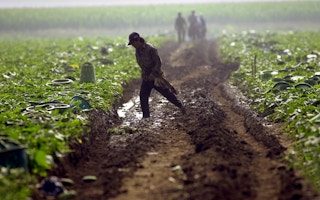When Raj heard British farmers were hiring seasonal workers from Nepal last year, he jumped at the chance to earn what he thought would be a sizeable income for his family.
Having already worked in Malaysia and Saudi Arabia, the father-of-two figured he could make enough in six months of farm work in Britain so as not to have to get a job abroad again.
After all, he had read on social media he could earn as much as 3,000 pounds (US$3,870) a month.
“There are not enough jobs back home in Nepal so this job was the biggest opportunity for me to take care of my family,” said Raj, who used a pseudonym as he had overstayed his UK visa.
The 36-year-old told Context he took out a loan of 260,000 Nepali rupees (US$1,973) for his visa and flights, thinking he would easily pay it off.
But British farms stopped hiring Nepali and Indonesian workers in January after reports that many had paid excessive recruitment fees that left them in debt bondage, and many had not returned home when their visas expired.
Some of those already in Britain, however, found themselves still saddled with debt. Since they would no longer be able to come back to Britain as seasonal workers again, more overstayed their visas and found informal jobs to try to make the money they needed, charities and immigration experts said.
“
It’s just a shame that some people really abused the system and took advantage of people. But that should not stop a company like us to start changing things. We want to make this sustainable.
Naseem Talukdar, managing director, Regency Recruitment
Debt bondage
Anti-slavery charity Focus on Labour Exploitation (FLEX) said migrant workers were often duped into paying illegal recruitment fees to local brokers in their home country.
“If you come to the country with this level of debt … then you can’t simply return to your home country. It’s reasonable to expect that people in that situation will have to find work elsewhere,” said FLEX Chief Executive Lucila Granada.
Bahadur, 40, who also used a pseudonym, said he borrowed 800,000 Nepali rupees from relatives to pay a local recruiter.
The father of one, who worked as a mountaineering guide before COVID-19 decimated tourism, said an agent told him he could save 400,000 Nepali rupees a month on a British farm.
Instead, Bahadur spent all his wages clearing his debt and had nothing to show for six gruelling months at a fruit farm.
“If I didn’t pay that big amount to an agent, I’d be able go back to my country after my work contract finished and come back here next season,” he said.
“But I had to send all the money back to pay off the loan. Now I need to work to save money and support my family.”
While many Nepali and Indonesian workers returned home, others like Raj and Bahadur are working illegally, desperate to pay off loans and earn enough to make their trip worthwhile, according to the Southeast and East Asian Centre (SEEAC), a community support group.
Nova-Fransisca Silitonga, a SEEAC project manager, said one Indonesian worker had put his family house up as collateral for a bank loan, while others had borrowed from neighbours.
“If you’re unable to pay that back, you will feel shame in your village and loan sharks might go to your family,” she said.
Bahadur said he applied for asylum when his seasonal worker visa expired and can legally remain in the country while the Home Office assesses his claim. But he is not hopeful his application will be approved.
“I am worried I cannot stay here for long. Either I will go to Portugal or stay here illegally after the Home Office decision,” he said.
Both Bahadur and Raj said some Nepali workers had used smugglers to go to European countries like Portugal, believing it was easier to get visas and jobs there.
Raj said it was unfair that workers had to go to such lengths to pay off debts.
“No one should have to take a loan and remain trapped in debt for a foreign job,” he said.
Labour shortage
Ukrainians used to be the largest group of seasonal agricultural workers in Britain, but when Russia invaded Ukraine in February 2022, the numbers coming fell sharply, according to official figures.
A handful of licensed recruiters - known as scheme operators - turned to Asia to plug the labour shortage.
Britain granted more than 35,000 seasonal worker visas in the 12 months up to March 2023, a rise of 10 per cent on the previous year, official data said.










